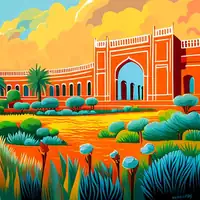
Eco-Tourism & Sustainable Travel Destinations in Delhi, India

1. Lodhi Gardens
This expansive garden is a green oasis in Delhi, showcasing historic tombs and lush landscapes, which promote biodiversity and relaxation amidst the urban sprawl. It helps address the issue of air pollution by providing a green lung for the city.
- Accessibility: Easily reachable via metro and public transport.
- Biodiversity: Home to various plant species and birds.
- Educational Value: Signage and information about historical sites.
- Picnicking: Ideal location for eco-friendly picnics.
- Facilities: Well-maintained pathways and rest areas.

2. Sunder Nursery
This heritage park not only restores Mughal gardens but also introduces sustainable practices by using native plants and composting waste. It addresses the challenge of garden maintenance and resource conservation.
- Restoration: Efforts to revive historical plants.
- Water Management: Rainwater harvesting initiatives.
- Waste Management: Implements composting techniques.
- Wildlife Habitat: Attracts various species of birds.
- Community Events: Hosts eco-friendly events and activities.

3. Yamuna Biodiversity Park
This park is dedicated to restoring the native biodiversity along the banks of the Yamuna river, contributing to the rejuvenation of the river ecosystem and providing educational insights into native flora and fauna.
- Conservation Effort: Focuses on native biodiversity.
- Educational Tours: Offers guided tours on ecology.
- Water Quality: Initiatives helping restore river health.
- Research: Site for ecological research projects.
- Volunteer Programs: Opportunities to engage in conservation work.

4. Aravalli Biodiversity Park
A project dedicated to restoring the Aravalli hill ecosystem in Delhi, addressing habitat loss for native wildlife and offering a peaceful retreat in nature.
- Native Plant Growth: Encourages native vegetation restoration.
- Wildlife Sanctuary: Protects local animal species.
- Trails: Eco-friendly walking paths for visitors.
- Awareness Programs: Educational programs for visitors.
- Seasonal Flora: Displays a variety of plants throughout the year.

5. Rajghat
A place of peace and remembrance, Rajghat is surrounded by serene gardens that sustain a variety of plant species, focusing on preserving the landscape in an urban growth zone.
- Significance: Mahatma Gandhi's memorial site.
- Eco Landscaping: Maintained using sustainable methods.
- Reflection Space: Designed for peaceful contemplation.
- Floral Diversity: Maintains a range of local plants.
- Historical Value: Offers insights into India's history.

6. Delhi Ridge
The Ridge acts as an essential ecological corridor in the city, protecting soil from erosion and providing a habitat for wildlife amidst urban expansion.
- Historical Terrain: Features ancient rock formations.
- Flora: Supports resilient tree species.
- Fauna: Inhabited by various reptiles and birds.
- Urban Breathing Space: Large forest cover in a city.
- Conservation Initiatives: Active programs to protect the area.

7. Asola Bhatti Wildlife Sanctuary
This is a critical refuge for wildlife in Delhi that mitigates the effects of urban encroachment and provides a home for local species.
- Habitat Protection: Preserves critical animal habitats.
- Bird Watching: Offers bird observation opportunities.
- Guided Walks: Educates visitors about local ecosystems.
- Conservation Programs: Efforts to counteract deforestation.
- Biodiversity Hotspot: Rich in flora and fauna.

8. Waste to Wonder Park
This park creatively uses waste materials to replicate world wonders, promoting recycling and sustainability while entertaining visitors.
- Recycling: Uses scrap material to create displays.
- Art Installations: Exhibits themed on global monuments.
- Environmental Awareness: Emphasizes sustainability via art.
- Family-Friendly: Suited for all ages with educational insights.
- Night Lighting: Eco-friendly LED lights for night visits.

9. The National Zoological Park
Focused on conservation education, this zoo uses green practices to improve living conditions for animals and raise awareness about wildlife conservation.
- Renewable Energy: Solar panels installed for energy use.
- Animal Care: Prioritizes ethical animal management.
- Endangered Species: Houses and breeds rare animals.
- Learning Environment: Visitor programs on biodiversity.
- Infrastructure: Eco-friendly visitor amenities.

10. Purana Qila Eco-zone
Incorporating historical preservation with green practices, this ancient fort promotes heritage conservation through eco-friendly actions.
- Historic Significance: An ancient fort dating back centuries.
- Energy Efficiency: Encourages sustainable tourism practices.
- Flora and Fauna: Supports local biodiversity.
- Eco Trails: Walkways surrounded by diverse plant life.
- Guided Tours: Insights into history and sustainable practices.

11. Garden of Five Senses
A sensory garden, designed to invite self-awareness with an emphasis on reconnecting with nature, helps promote mental well-being and urban sustainability.
- Diverse Plots: Zones dedicated to different sensory experiences.
- Sculptures: Incorporates art to enhance visitor experience.
- Green Workshops: Hosts eco-friendly events and sessions.
- Community Hub: Welcomes gatherings and sustainable events.
- Accessibility: Well-connected to public transport systems.

12. Nehru Park
A historic park known for its open-air concerts and cultural events, providing a platform for sustainable cultural engagement in green spaces.
- Cultural Oasis: Venue for eco-friendly music events.
- Open Spaces: Large lawns reducing urban stress.
- Native Trees: Rich with various indigenous trees.
- Peaceful Retreat: Calming environment for visitors.
- Health Activities: Popular spot for yoga and meditation.

13. Shankar's International Dolls Museum
Although not strictly outdoors, this museum takes strides to use environmentally-conscious practices and encourages cultural sustainability.
- Cultural Preservation: Showcases global doll collection.
- Resource Management: Implements sustainable exhibit practices.
- Educational Programs: Offers learning experiences about global cultures.
- Family Appeal: Welcomes diverse audiences.
- Energy Consumption: Reduces carbon footprint with efficient energy use.

14. Sanjay Van
A sprawling city forest preserve that offers a habitat for numerous birds and plants, helping combat deforestation and promoting urban forestry.
- Adventure Trails: Offers paths for walking and cycling.
- Bird Watching: Home to a wide variety of birds.
- Plant Diversity: Features numerous native species.
- Natural Retreat: Large expanse of protected green area.
- Pollution Reduction: A critical green lung for the city.

15. Delhi’s Bazaars (Eco Friendly Markets)
These markets support local artisans by promoting goods produced through sustainable practices, combating the use of unsustainable products.
- Handmade Goods: Focus on locally-sourced products.
- Ethical Commerce: Encourages fair trade and ethical buying.
- Zero-Waste: Vendors practicing waste minimization.
- Community Centers: Hub for sustainable consumerism.
- Support Local: Boosts local economy and artisans.

16. Eco Lodges and Green Hotels
Multiple eco-friendly accommodations in and around Delhi promote energy savings and sustainable hospitality practices, addressing the tourism industry's carbon footprint.
- Sustainable Practices: Use of eco-friendly amenities.
- Local Sourcing: Food procurement from local providers.
- Water Conservation: Implements efficient water use techniques.
- Green Certification: Certified by sustainability organizations.
- Tourist Attraction: Popular for eco-conscious travelers.

17. Delhi’s Bicycle Tours
These tours encourage low-carbon exploration of the city, supporting reduction in fuel emissions and promoting a healthier lifestyle.
- Sustainable Travel: Promotes eco-friendly commuting.
- Local Insights: Offers authentic cultural experiences.
- Health Promotion: Encourages physical activity.
- Reduced Traffic: Avoids congested routes.
- Flexibility: Various tour options available.

18. Raahgiri Day
This event transforms city streets into car-free zones, encouraging activities like cycling and running, which raise awareness about the benefits of a vehicle-free environment.
- Community Wellness: Promotes outdoor fitness and recreation.
- Emission Free: Reduces vehicle emissions temporarily.
- Public Engagement: Increases awareness on urban issues.
- Entertainment: Hosts performances and activities.
- Traffic Reduction: Decreases traffic congestion temporarily.

19. Metro Walk
The walkable areas around Delhi's Metro stations are developed with eco-friendly landscapes, supporting sustainable urban commuting and reducing reliance on cars.
- Green Transit: Encourages the use of public transportation.
- Economic Influence: Boosts nearby businesses sustainably.
- Pollution Control: Limits vehicular pollution.
- Safety: Implements safe walkways.
- Connectivity: Integrated with city’s transport grid.

20. Yamuna Eco-Sustainability Project
An initiative focusing on the restoration and cleanliness of the Yamuna River, directly targeting water pollution and promoting eco-friendly practices.
- River Cleaning: Develops methods to reduce water pollutants.
- Community Involvement: Engages local participation in clean-up efforts.
- Flora and Fauna Restoration: Aims to revive river biodiversity.
- Awareness Campaigns: Educates public on water conservation.
- Continuous Monitoring: Initiates ongoing river health assessments.